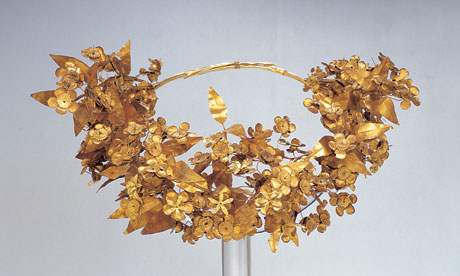The historian Robin Lane Fox was reduced to helpless tears at the opening of an exhibition in Oxford, over the glittering golden diadem of a woman who died more than 2,300 years ago and silver cups and wine jugs last used by Alexander the Great and his father, Philip II .
Lane Fox – an Oxford academic who has not only written widely on Alexander the Great but also led the cavalry charge as an extra and adviser in the recent Hollywood film – described the treasures at the Ashmolean museum, retrieved from the graves and the palace of the king and his ancestors, as "the greatest day of classical exhibitions in my lifetime". He called the diadem of hundreds of golden myrtle flowers and leaves, probably worn by a queen who killed herself to join her husband, Philip II, in the grave, "the single most beautiful object in gold on the planet".
Another diadem of golden oak leaves on display had only been rediscovered in 2008 after it was deliberately hidden with the cremated remains of a teenage boy who may have been Alexander's murdered son.
Only a handful of the jewellery, weapons, armour, sculptures and fragments of architecture has ever been seen by the public anywhere, even in Greece. Some were excavated only in the past few years. Most of the pieces have been brought by Angeliki Kottaridi, curator and archaeologist, straight from her stores in Vergina – a small town situated on top of Aegae, the ancient capital of Macedon. The site has only begun in the last 30 years to reveal its secrets, which include the unlooted tombs of Philip II, of a queen who may have been his grandmother buried covered from head to foot in gold, and of Alexander IV, the last of the line of kings.
Only a fraction of the cemetery (comprising more than 500 burial mounds) and Philip's huge palace have been excavated – enough, Lane Fox said, to suggest it made Buck House "look like a cottage". The building, as proved by the dazzling silver, was the scene of royal banquets on a scale which might have made Cecil B DeMille splutter: the 16 banqueting halls had space on double couches for more than 400 diners, while the court had room for 3,500 seated guests.
Future excavation, and the plans for a major museum to display the extraodinary finds, may depend on what the future holds for the tottering Greek economy.
"Our strength is our past, and our memory," Kottaridi said. "We need Alexander to help us; we need our pride restored again."
Guardian.co.uk/
Lane Fox – an Oxford academic who has not only written widely on Alexander the Great but also led the cavalry charge as an extra and adviser in the recent Hollywood film – described the treasures at the Ashmolean museum, retrieved from the graves and the palace of the king and his ancestors, as "the greatest day of classical exhibitions in my lifetime". He called the diadem of hundreds of golden myrtle flowers and leaves, probably worn by a queen who killed herself to join her husband, Philip II, in the grave, "the single most beautiful object in gold on the planet".
Another diadem of golden oak leaves on display had only been rediscovered in 2008 after it was deliberately hidden with the cremated remains of a teenage boy who may have been Alexander's murdered son.
Only a handful of the jewellery, weapons, armour, sculptures and fragments of architecture has ever been seen by the public anywhere, even in Greece. Some were excavated only in the past few years. Most of the pieces have been brought by Angeliki Kottaridi, curator and archaeologist, straight from her stores in Vergina – a small town situated on top of Aegae, the ancient capital of Macedon. The site has only begun in the last 30 years to reveal its secrets, which include the unlooted tombs of Philip II, of a queen who may have been his grandmother buried covered from head to foot in gold, and of Alexander IV, the last of the line of kings.
Only a fraction of the cemetery (comprising more than 500 burial mounds) and Philip's huge palace have been excavated – enough, Lane Fox said, to suggest it made Buck House "look like a cottage". The building, as proved by the dazzling silver, was the scene of royal banquets on a scale which might have made Cecil B DeMille splutter: the 16 banqueting halls had space on double couches for more than 400 diners, while the court had room for 3,500 seated guests.
Future excavation, and the plans for a major museum to display the extraodinary finds, may depend on what the future holds for the tottering Greek economy.
"Our strength is our past, and our memory," Kottaridi said. "We need Alexander to help us; we need our pride restored again."
Guardian.co.uk/


Δεν υπάρχουν σχόλια:
Δημοσίευση σχολίου